Recent events in Libya have refocused attention on Libya’s remaining chemical agents, with particular concern over the possibility that Moammar Gadhafi will use them against the Libyan insurgents or against other targets, such as Western civilians. But there are also fears that the Libyan government could somehow lose control of some of the agents, whether due to ongoing domestic chaos or an eventual collapse of the regime, allowing terrorists to acquire them. Leaders of the coalition currently enforcing the U.N.-mandated no-fly zone over Libya need to adopt a strong declaratory policy against any misuse of these agents, even while they […]
Terrorism Archive
Free Newsletter

The opening acts of the 21st century have fundamentally challenged long-held notions of military power. The past decade has unveiled not only the disruptive power of terrorist groups with global reach, but also the ability of low-budget insurgent groups to directly confront the best military forces of the West — with surprising success. Moreover, recent revolutionary events across the Arab world have demonstrated the limits of military power when facing mass popular uprisings. Disorder, chaos and violent extremism seem on course to replace state-on-state violence as the most common forms of conflict in the new century. Given this new security […]

For decades now, strategic experts have predicted that our world was on the verge of a break-out in nuclear proliferation that would see us grappling with two- or three-dozen nuclear powers. Indeed, the inexorable spread of nuclear weapons is the closest thing to an unassailable canon in the field of international relations, as one cannot possibly employ the term “nuclear proliferation” without preceding it with the modifier “increasing.” This unshakeable belief, wholly unsupported by any actual evidence, drives many Cold War-era “wise men” to argue that mutually assured destruction (MAD) and strategic deterrence in general are obsolete and therefore immoral […]
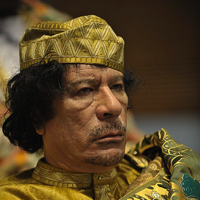
Thursday’s U.N.-sanctioned no-fly zone over Libya and the military strikes against Moammar Gadhafi’s ground forces that followed over the weekend may have come too late for Libya’s freedom-seeking people. Even a ceasefire or internationally imposed standoff between Gadhafi’s forces and the anti-government fighters in Benghazi and elsewhere would merely maintain the status quo, with Gadhafi remaining in control of most of the country. If so, Gadhafi will have demonstrated to autocrats everywhere that terror is an effective means of maintaining power at home and instilling uncertainty and fear abroad. This should come as no surprise, as Gadhafi is not new […]

Editor’s note: This is the last of a five-part series examining security and development aid in East Africa. Part I provided an overview of the challenges facing East Africa. Part II examined the overlap between public health and security challenges. Part III examined the overlap between small-arms trafficking and WMD nonproliferation. Part IV examined the overlap between counterterrorism and efforts to contain criminal violence. Part V provides success stories for the security-development model and discusses next steps. In East Africa, pressing regional challenges — including the inability to detect and treat disease, the flow of illicit firearms across unsecured borders […]
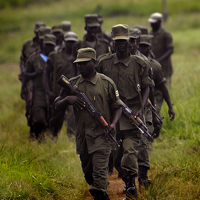
Editor’s note: This is the fourth of a five-part series examining security and development aid in East Africa. Part I provided an overview of the challenges facing East Africa. Part II examined the overlap between public health and security challenges. Part III examined the overlap between small-arms trafficking and WMD nonproliferation. Part IV examines the overlap between counterterrorism and efforts to contain criminal violence. Part V will provide success stories for the security-development model and discuss next steps. On July 11, 2010, bombs ripped through crowds gathered to watch the World Cup soccer final in downtown Kampala, Uganda, leaving 76 […]
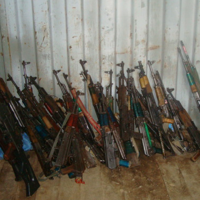
Editor’s note: This is the third of a five-part series examining security and development aid in East Africa. Part I provided an overview of the challenges facing East Africa. Part II examined the overlap between public health and security challenges. Part III examines the overlap between small arms trafficking and WMD nonproliferation. Part IV will examine the overlap between counterterrorism and efforts to contain criminal violence. Part V will provide success stories for the security-development model and discuss next steps. Former U.N. Secretary-General Kofi Annan famously called small arms and light weapons (SALW) “the weapons of choice for the killers […]
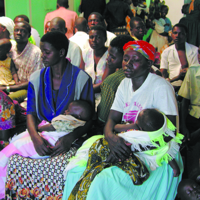
Editor’s note: This is the second of a five-part series examining security and development aid and capacity-building in East Africa. Part I provided an overview of the challenges facing East Africa. Part II examines the overlap between public health and security challenges. Part III will examine the overlap between small arms trafficking and WMD nonproliferation. Part IV will examine the overlap between counterterrorism and efforts to contain criminal violence. Part V will provide success stories for the security-development model and discuss next steps. As the burden of disease declines in much of the world, urbanization and changing lifestyles in Africa, […]
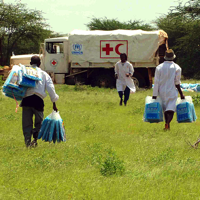
Editor’s note: This is the first of a five-part series examining security and development aid and capacity-building in East Africa. Part I provides an overview of the challenges facing East Africa. Part II will examine the overlap between public health and security challenges. Part III will examine the overlap between small arms trafficking and WMD nonproliferation. Part IV will examine the overlap between counterterrorism and efforts to contain criminal violence. Part V will provide success stories for the security-development model and discuss next steps. According to the World Bank, more than half of the people in sub-Saharan Africa live in […]

In November 2010, the Saudi monarch, King Abdullah bin Abd al-Aziz, traveled to the United States for medical treatment, touching off rounds of fevered speculation about the prospects for succession in Saudi Arabia. Crown Prince Sultan bin Abd al-Aziz’s own frail health and recent convalescence in Morocco gave the speculation further life. Of course, due to the royal family’s opaque approach to the issue, discussions of the internal rivalries that are reputed to divide the royal family are often based on mere conjecture. With little concrete information upon which to ground analysis, each decision of the royal family is then […]
